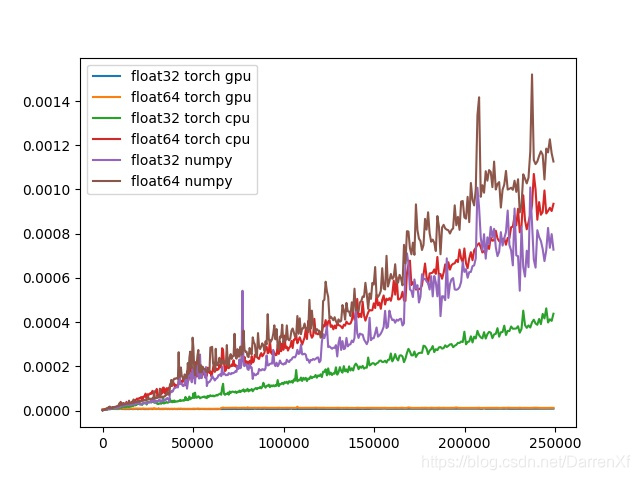下面是我机器中的cpu和gpu型号
31.4 GiB
Intel® Core™ i7-8700K CPU @ 3.70GHz × 12
GeForce GTX 1080 Ti/PCIe/SSE2
64-bit
代码会在下面给出
先看下整体的输出效果 对比了float32 float64 分别用numpy,torch cpu 以及torch gpu 运算矩阵相乘
运行1000次 方阵大小1-500,也就是元素数1-25万
1000_1_500
cpu 与gpu 运行时间对比图

看消耗时间的话,有gpu加速的矩阵运算时间相对来看的话基本上不增加
下面是cpu与gpu的加速效果对比图

这个结果是比较意外的,有两点
1.有几十倍到100倍的加速效果,我前几次用其他的工具测试达不到这个加速效果
2.经验认为float32的gpu加速效果会更好,这个测试从加速效果上来看float64不比float32效果差.
然后更大的矩阵
5_500_3000


加速效果上升到了好几千,相对于numpy来说.我这里是有点不敢相信的,所以把它们矩阵相乘的输出求和得到的值打印出来作比较,发现基本上差不多.(求和后的值并不相等,我认为这并不是计算机算错了,而是不同精度会有后舍入误差).可能是真的有这么好的加速效果,我的gpu没有偷懒.
然后更大的矩阵的测试
1_1_10000

这么大的矩阵cpu的运行时间已经是秒级别的了,而gpu还没有看到明显的增长.

加速的效果又上了一个数量级. 看到了加速效果有波峰和波谷
小矩阵的局部图
1000_1_100

这个级别的矩阵加速似乎并不是很明显. 尤其是元素数两千之前,cpu是比gpu效果好的.
元素数目超过两千就可以选择用gpu,能有加速效果.

元素数超过2000后会有加速效果,但是加速效果限于1倍到两倍.这个值也会根据不同的cpu gpu 变化吧.
下面的图就是一句话 有加速效果.
1000_101_200


1000_201_300


1000_301_400


1000_401_500


main.py
#!/usr/bin/python
# -*- coding: utf-8 -*-
#####################################
# File name : main.py
# Create date : 2019-01-10 16:39
# Modified date : 2019-01-24 14:05
# Author : DARREN
# Describe : not set
# Email : [email protected]
#####################################
from __future__ import division
from __future__ import print_function
import os
import time
import numpy as np
import torch
import matplotlib.pyplot as plt
def create_path(path):
if not os.path.isdir(path):
os.makedirs(path)
def get_file_full_name(path, name):
create_path(path)
if path[-1] == "/":
full_name = path + name
else:
full_name = path + "/" + name
return full_name
def create_file(path, name, open_type='w'):
file_name = get_file_full_name(path, name)
return open(file_name, open_type)
def _plot_record(record, full_path):
_plot_cpu_gpu_time(record, full_path)
_plot_acceleration(record, full_path)
def _get_full_path(repeats, size_begin, size_end):
if not os.path.exists("./output"):
os.makedirs("./output")
path_str = "./output/%s_%s_%s" % (repeats, size_begin, size_end)
return path_str
def _plot_cpu_gpu_time(record, full_path):
float32_numpy_lt = []
float64_numpy_lt = []
float32_cpu_lt = []
float64_cpu_lt = []
float32_gpu_lt = []
float64_gpu_lt = []
steps = []
for key in record:
steps.append([key])
steps.sort()
for i in range(len(steps)):
step_dic = record[steps[i][0]]
float32_numpy_value = step_dic["float32_numpy"]
float32_numpy_lt.append(float32_numpy_value)
float64_numpy_value = step_dic["float64_numpy"]
float64_numpy_lt.append(float64_numpy_value)
float32_cpu_value = step_dic["float32_torch_cpu"]
float32_cpu_lt.append(float32_cpu_value)
float64_cpu_value = step_dic["float64_torch_cpu"]
float64_cpu_lt.append(float64_cpu_value)
float32_gpu_value = step_dic["float32_torch_gpu"]
float32_gpu_lt.append(float32_gpu_value)
float64_gpu_value = step_dic["float64_torch_gpu"]
float64_gpu_lt.append(float64_gpu_value)
float32_numpy_lt = np.array(float32_numpy_lt)
float64_numpy_lt = np.array(float64_numpy_lt)
float32_cpu_lt = np.array(float32_cpu_lt)
float64_cpu_lt = np.array(float64_cpu_lt)
float32_gpu_lt = np.array(float32_gpu_lt)
float64_gpu_lt = np.array(float64_gpu_lt)
steps = np.array(steps)
steps = steps*steps
float32_gpu_line, = plt.plot(steps, float32_gpu_lt)
float64_gpu_line, = plt.plot(steps, float64_gpu_lt)
float32_cpu_line, = plt.plot(steps, float32_cpu_lt)
float64_cpu_line, = plt.plot(steps, float64_cpu_lt)
float32_numpy_line, = plt.plot(steps, float32_numpy_lt)
float64_numpy_line, = plt.plot(steps, float64_numpy_lt)
# pylint: disable=bad-continuation
line_lt = [
float32_gpu_line,
float64_gpu_line,
float32_cpu_line,
float64_cpu_line,
float32_numpy_line,
float64_numpy_line,
]
labels_lt = (
"float32 torch gpu",
"float64 torch gpu",
"float32 torch cpu",
"float64 torch cpu",
"float32 numpy",
"float64 numpy",
)
# pylint: enable=bad-continuation
plt.legend(handles=line_lt, labels=labels_lt, loc='best')
full_path_name = "%s/cpu_gpu.jpg" % (full_path)
# plt.show()
plt.savefig(full_path_name)
plt.close()
def _plot_acceleration(record, full_path):
float64_acceleration_lt = []
float32_acceleration_lt = []
float64_np_torch_cpu_acceleration_lt = []
float32_np_torch_cpu_acceleration_lt = []
float64_np_torch_gpu_acceleration_lt = []
float32_np_torch_gpu_acceleration_lt = []
steps = []
for key in record:
steps.append([key])
steps.sort()
for i in range(len(steps)):
step_dic = record[steps[i][0]]
float64_acceleration_lt.append(step_dic["float64_torch_acceleration"])
float32_acceleration_lt.append(step_dic["float32_torch_acceleration"])
float64_np_torch_cpu_acceleration_lt.append(step_dic["float64_np_torch_cpu_acceleration"])
float32_np_torch_cpu_acceleration_lt.append(step_dic["float32_np_torch_cpu_acceleration"])
float64_np_torch_gpu_acceleration_lt.append(step_dic["float64_np_torch_gpu_acceleration"])
float32_np_torch_gpu_acceleration_lt.append(step_dic["float32_np_torch_gpu_acceleration"])
float64_acceleration_lt = np.array(float64_acceleration_lt)
float32_acceleration_lt = np.array(float32_acceleration_lt)
float64_np_torch_cpu_acceleration_lt = np.array(float64_np_torch_cpu_acceleration_lt)
float32_np_torch_cpu_acceleration_lt = np.array(float32_np_torch_cpu_acceleration_lt)
float64_np_torch_gpu_acceleration_lt = np.array(float64_np_torch_gpu_acceleration_lt)
float32_np_torch_gpu_acceleration_lt = np.array(float32_np_torch_gpu_acceleration_lt)
steps = np.array(steps)
steps = steps*steps
l1, = plt.plot(steps, float32_acceleration_lt)
l2, = plt.plot(steps, float64_acceleration_lt)
l3, = plt.plot(steps, float32_np_torch_cpu_acceleration_lt)
l4, = plt.plot(steps, float64_np_torch_cpu_acceleration_lt)
l5, = plt.plot(steps, float32_np_torch_gpu_acceleration_lt)
l6, = plt.plot(steps, float64_np_torch_gpu_acceleration_lt)
# pylint: disable=bad-continuation
line_lt = [
l1,
l2,
l3,
l4,
l5,
l6,
]
labels_lt = (
'float32 torch acceleration',
'float64 torch acceleration',
'float64 np torch cpu acceleration',
'float32 np torch cpu acceleration',
'float64 np torch gpu acceleration',
'float32 np torch gpu acceleration',
)
# pylint: enable=bad-continuation
plt.legend(handles=line_lt, labels=labels_lt, loc='best')
full_path_name = "%s/acceleration.jpg" % (full_path)
# plt.show()
plt.savefig(full_path_name)
plt.close()
def _write_status(file_obj, i, time_lt):
float32_acceleration = time_lt[1] / time_lt[3]
float64_acceleration = time_lt[0] / time_lt[2]
float64_cpu_str = "i:%s float64 cpu:%s" % (i, time_lt[0])
float32_cpu_str = "i:%s float32 cpu:%s" % (i, time_lt[1])
float64_gpu_str = "i:%s float64 gpu:%s" % (i, time_lt[2])
float32_gpu_str = "i:%s float32 gpu:%s" % (i, time_lt[3])
float64_numpy_str = "i:%s float64 numpy:%s" % (i, time_lt[4])
float32_numpy_str = "i:%s float32 numpy:%s" % (i, time_lt[5])
float32_torch_acceleration_str = "float32 torch acceleration:%s" % float32_acceleration
float64_torch_acceleration_str = "float64 torch acceleration:%s" % float64_acceleration
file_obj.write("%s\n" % float64_cpu_str)
file_obj.write("%s\n" % float32_cpu_str)
file_obj.write("%s\n" % float64_gpu_str)
file_obj.write("%s\n" % float32_gpu_str)
file_obj.write("%s\n" % float64_numpy_str)
file_obj.write("%s\n" % float32_numpy_str)
file_obj.write("%s\n" % float32_torch_acceleration_str)
file_obj.write("%s\n" % float64_torch_acceleration_str)
print(float64_cpu_str)
print(float32_cpu_str)
print(float64_gpu_str)
print(float32_gpu_str)
print(float64_numpy_str)
print(float32_numpy_str)
print(float32_torch_acceleration_str)
print(float64_torch_acceleration_str)
def _record_status(record, i, time_lt):
dic = {}
dic["float64_torch_cpu"] = time_lt[0]
dic["float32_torch_cpu"] = time_lt[1]
dic["float64_torch_gpu"] = time_lt[2]
dic["float32_torch_gpu"] = time_lt[3]
dic["float64_numpy"] = time_lt[4]
dic["float32_numpy"] = time_lt[5]
dic["float64_torch_acceleration"] = time_lt[0] / time_lt[2]
dic["float32_torch_acceleration"] = time_lt[1] / time_lt[3]
dic["float64_np_torch_cpu_acceleration"] = time_lt[4] / time_lt[0]
dic["float32_np_torch_cpu_acceleration"] = time_lt[5] / time_lt[1]
dic["float64_np_torch_gpu_acceleration"] = time_lt[4] / time_lt[2]
dic["float32_np_torch_gpu_acceleration"] = time_lt[5] / time_lt[3]
record[i] = dic
def _get_numpy_take_time(x, y, repeats, data_type):
x = np.array(x, dtype=data_type)
y = np.array(y, dtype=data_type)
t0 = time.time()
for i in range(repeats):
z = np.matmul(x, y)
t1 = time.time()
v = z.sum()
all_time = t1 - t0
avg_time = all_time / repeats
return avg_time, v
def _get_take_time(x, y, repeats, data_type, dev="cpu"):
x = torch.from_numpy(x)
x = x.type(data_type)
y = torch.from_numpy(y)
y = y.type(data_type)
if dev == "gpu":
device = torch.device("cuda")
x = x.to(device)
y = y.to(device)
t0 = time.time()
for i in range(repeats):
z = torch.matmul(x, y)
t1 = time.time()
v = z.sum()
all_time = t1 - t0
avg_time = all_time / repeats
return avg_time, v.item()
def test_cpu_gpu(repeats, size_begin, size_end, step=1):
record = {}
full_path = _get_full_path(repeats, size_begin, size_end)
file_obj = create_file(full_path, "output")
for s in range(size_begin, size_end, step):
time_lt = []
x = np.random.randn(s, s)
y = np.random.randn(s, s)
float64_cpu_time, v1 = _get_take_time(x, y, repeats, torch.double, "cpu")
float32_cpu_time, v2 = _get_take_time(x, y, repeats, torch.float, "cpu")
time_lt.append(float64_cpu_time)
time_lt.append(float32_cpu_time)
float64_gpu_time, v3 = _get_take_time(x, y, repeats, torch.double, "gpu")
float32_gpu_time, v4 = _get_take_time(x, y, repeats, torch.float, "gpu")
time_lt.append(float64_gpu_time)
time_lt.append(float32_gpu_time)
float64_numpy_time, v5 = _get_numpy_take_time(x, y, repeats, np.float64)
float32_numpy_time, v6 = _get_numpy_take_time(x, y, repeats, np.float32)
time_lt.append(float64_numpy_time)
time_lt.append(float32_numpy_time)
print(v1, v2, v3, v4, v5, v6)
file_obj.write("%s %s %s %s %s %s" % (v1, v2, v3, v4, v5, v6))
_write_status(file_obj, s, time_lt)
_record_status(record, s, time_lt)
file_obj.close()
_plot_record(record, full_path)
def test_matmul(repeats, max_size, step):
for i in range(int(max_size / step)):
size_begin = 1 + i*step
size_end = (i + 1)*step
test_cpu_gpu(repeats, size_begin, size_end)
size_begin = 1
size_end = max_size
test_cpu_gpu(repeats, size_begin, size_end)
def test():
repeats = 1000
max_size = 500
step = 100
test_matmul(repeats, max_size, step)
repeats = 5
size_begin = 500
size_end = 3000
step = 5
test_cpu_gpu(repeats, size_begin, size_end, step)
repeats = 1
size_begin = 1
size_end = 10000
step = 50
test_cpu_gpu(repeats, size_begin, size_end, step)
repeats = 1
size_begin = 10000
size_end = 20000
step = 200
test_cpu_gpu(repeats, size_begin, size_end, step)
test()